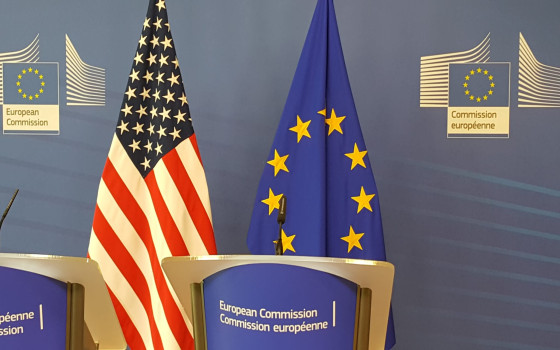
European-US agreement on tariffs: Washington and Brussels praise it, while the largest political bloc in the European Parliament rejects it.

- Europe and Arabs
- Monday , 28 July 2025 3:5 AM GMT
Brussels: Europe and the Arabs
A European statement issued in Brussels said that a trade agreement had been reached with the United States regarding tariffs on European goods entering the US market. While European Commission President Ursula von der Leyen praised the agreement, the largest political bloc in the European Parliament expressed its rejection of its contents.
US President Donald Trump said that the United States and the European Union had reached a trade agreement that includes imposing 15% tariffs on European goods entering the US market, along with significant European purchases of American energy and military equipment.
The US president added that the agreement also includes $600 billion in European investments in the United States, according to Reuters.
European Commission President Ursula von der Leyen said that the agreement includes imposing 15% tariffs, noting that the move aims to rebalance trade relations between the two sides.
Earlier, Donald Trump said that there is a good chance that the United States and the European Union will reach a trade agreement, citing three or four major points of disagreement. He explained that the main point of contention is fairness, citing barriers to US exports of cars and agriculture. He pointed out that the US will not reduce tariffs on the European Union, and that we have an agreement with Japan and are close to reaching an agreement with China.
In a statement issued from the Commission headquarters in Brussels, President von der Leyen said, "We have reached an agreement on tariffs and trade with the United States.
An agreement that establishes certainty in uncertain circumstances and ensures stability and predictability for citizens and businesses on both sides of the Atlantic. It is an agreement between the two largest economies in the world. Our trade volume amounts to $1.7 trillion annually, and together we form a market of 800 million people, representing nearly 44% of global GDP. Just weeks after the NATO summit, this agreement represents the second building block, thus confirming the transatlantic partnership.
Let me go into some detail. We have settled on a single tariff rate of 15% on the vast majority of EU exports. This rate applies to most sectors, including cars, semiconductors, and pharmaceuticals. This 15% rate represents a clear ceiling, not Accumulated and comprehensive. Therefore, it provides important clarity for our citizens and businesses. This is crucial.
Today, we also agreed on low tariffs on a number of strategic products. This includes all aircraft and their components, certain chemicals, certain generic medicines, semiconductor equipment, certain agricultural products, natural resources, and basic raw materials. We will continue working to add more products to this list.
With regard to steel and aluminum, the EU and the US face a common external challenge: global overcapacity. We will work together to ensure fair global competition. To reduce barriers between us, tariffs will be reduced and quotas will be implemented.
We will also strengthen our energy cooperation. Purchases of US energy products will diversify our sources of supply and contribute to Europe's energy security. We will replace Russian gas and oil with significant purchases of US liquefied natural gas, oil, and nuclear fuel.
US AI chips will help power our giant AI factories and help the US maintain its technological edge.
With this deal, we are strengthening our ability On our business forecasting. In these turbulent times, this is essential for our companies to plan and invest. We are guaranteeing immediate tariff relief. This will have a clear impact on our companies' bottom lines. With this agreement, we secure access to our largest export markets. At the same time, we will provide US products with better access to our market. This will benefit European consumers and enhance the competitiveness of our businesses. This agreement provides a framework through which we can reduce tariffs on more products, address non-tariff barriers, and cooperate on economic security. When the EU and the US work together as partners, the benefits are tangible for both sides.
At the same time, we are building a truly global economic foreign policy. That's why we're starting from within. We're taking bold action to make Europe more competitive, innovative, and dynamic. Our single market, with 450 million consumers, is our greatest asset and safe haven, especially in turbulent times.
We're also building new trading partnerships around the world, expanding from our existing 76. We've concluded negotiations in recent months with Mercosur, Mexico, and Indonesia. In a world Turbulent, Europe is a reliable partner. We will continue to strike deals that contribute to preserving our prosperity.
Finally, I would like to personally thank President Trump for his personal commitment and leadership to achieve this achievement. He is a tough negotiator, but also a master deal-maker. I would like to thank Commissioner Maroš Šefčović and his team for their hard work and skillful guidance; they have done most of the hard work. And I would like to thank our member states for their trust and commitment. Our unity is our strength, at home and abroad. We will continue to work hard for the benefit of all Europeans. US tariffs: Trade must be based on rules
In response to this, Jürgen Warborne, spokesperson for the European People's Party's Group on International Trade, rejected the US tariffs and affirmed the EPP's support for rules-based multilateral trade. Following European Commission President Ursula von der Leyen's meeting with US President Donald Trump, Warborne stated: "Imposing a 15% basic tariff is a blatant violation of WTO principles and a severe blow to European industrial competitiveness." He added: "Amid rising geopolitical tensions, a rules-based trading system has become even more important..."
It is worth noting that the EPP Group is the largest political bloc in the European Parliament, comprising 188 members from all EU member states.












No Comments Found